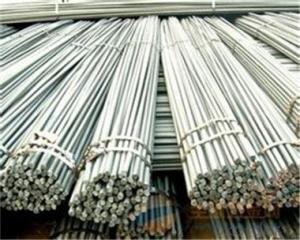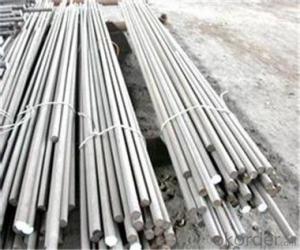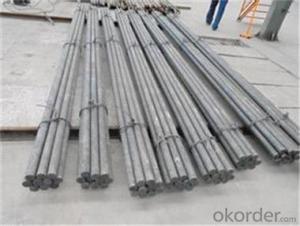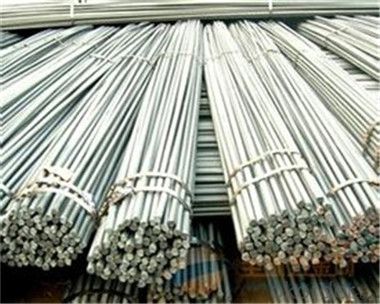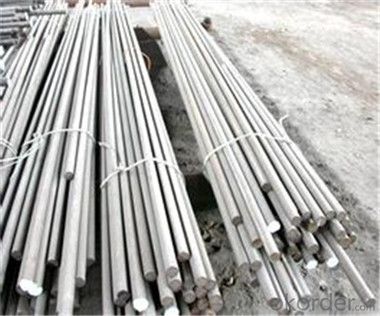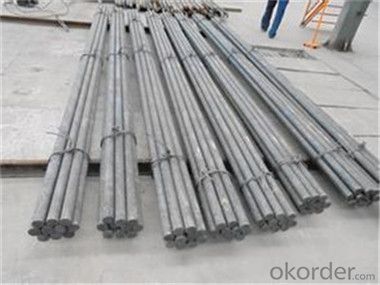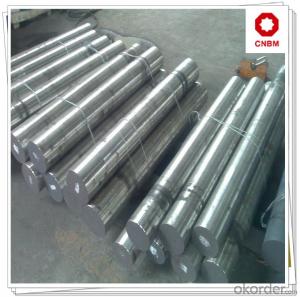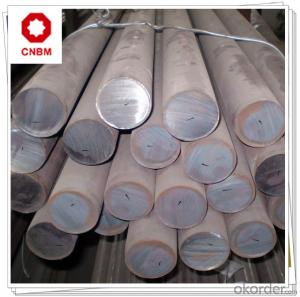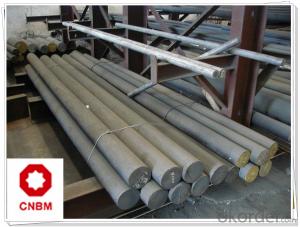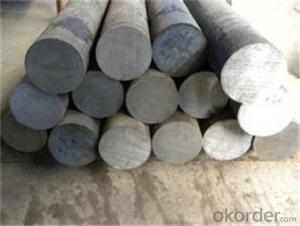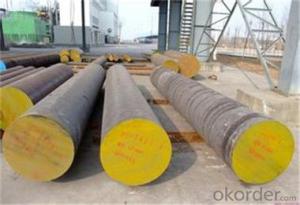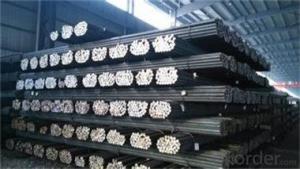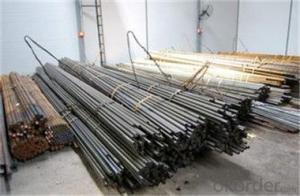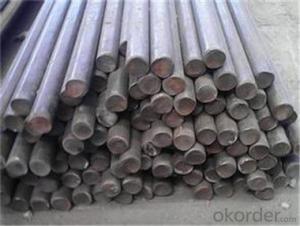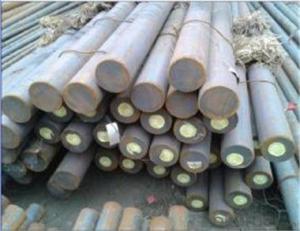Hot Rolled 12mm Steel Rod Price Steel Round Bar from China
- Loading Port:
- Tianjin
- Payment Terms:
- TT OR LC
- Min Order Qty:
- 12 m.t.
- Supply Capability:
- 2000000 m.t./month
OKorder Service Pledge
OKorder Financial Service
You Might Also Like
Description of steel round bar:
(1) Thickness of not more than 2MM sheet, efficient blanking die, punch die and pressure die etc.
(2) All kinds of scissors, inserts, woodworking blade.
(3) Thread rolling die and wear-resistant slider.
Festures of steel round bar:
4340 Forged Round Steel Bar
1.Dia 80-800mm Length:2000-13000mm or as required
2.Technique:Forged
Mild Steel Round Bar is used for making security grills, screens, Construction and Machine Manufacture.Stainless steel bar is widely used in Architecture,Machine Manufacture,Power Station,Electric Equipment and Factory,Oil and Chemical Industry,Food and Medical Industry,
City Decoration Industry
Specifications of steel round bar:
Round bar | Diameter(mm) | Length (mm) | |
10~800 | 2000~5800 | ||
plate/sheet | Thickness(mm) | Width (mm) | Length (mm) |
10~800 | 80~2300 | 2000~5800
|
Images of coffee steel round bar:
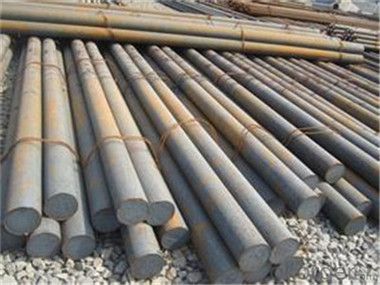
FAQ:
1. What is your package?
Packing situation: standard seaworthy packing or as customer required.
2. How long is the lead time?
Delivery time: 45 days after order confirmed.
3. What payment term do you accept?
Payment: T/T or L/C at sight.
- Q: What are the advantages of using duplex steel round bars?
- Duplex steel round bars offer numerous benefits for various applications. Firstly, they provide exceptional resistance to corrosion. By combining chromium, nickel, and molybdenum, this steel can withstand harsh conditions found in marine and chemical industries. This makes it ideal for high exposure to corrosive elements. Secondly, duplex steel round bars possess great strength and toughness. The unique microstructure of this steel, combining ferrite and austenite phases, results in greater strength compared to traditional stainless steels. This makes them suitable for demanding applications requiring high load-bearing capacities. Additionally, duplex steel round bars exhibit excellent fatigue resistance. This makes them perfect for applications subjected to cyclic loading or dynamic stress, such as structural components or machinery parts. Their fatigue resistance allows for extended service life and reliability. Another advantage of using duplex steel round bars is their superior weldability. Their balanced chemical composition and microstructure enable easy fabrication and joining, reducing production time and costs in various industries. Furthermore, duplex steel round bars demonstrate exceptional resistance to stress corrosion cracking (SCC). This makes them a preferred choice for applications with a high risk of SCC, such as offshore and oil and gas industries. Lastly, duplex steel round bars provide cost-effective solutions. Despite their superior properties, they are often more cost-effective than other high-performance materials. Their long service life, reduced maintenance requirements, and overall durability contribute to lower lifecycle costs, making them an economical choice for various applications. In conclusion, duplex steel round bars offer excellent corrosion resistance, high strength and toughness, good fatigue resistance, superior weldability, resistance to stress corrosion cracking, and cost-effectiveness. These properties make them a preferred choice for industries such as oil and gas, chemical processing, marine, and structural applications.
- Q: Can steel round bars be used for making hydraulic cylinders or pistons?
- Yes, steel round bars can be used for making hydraulic cylinders or pistons. Steel is a commonly used material in hydraulic systems due to its strength, durability, and ability to withstand high pressure. The round shape of the bars allows for easy machining and shaping into the desired cylinder or piston components.
- Q: What are the common applications of steel round bars?
- Steel round bars have numerous common applications across various industries. One common application is in construction, where steel round bars are used for structural support in buildings, bridges, and other infrastructure projects. They are also commonly used in the automotive industry for manufacturing of components such as axles, crankshafts, and suspension systems. Additionally, steel round bars find applications in the manufacturing of machinery, tools, and equipment due to their strength and durability. They are also utilized in the production of furniture, appliances, and various hardware products.
- Q: How do you prevent steel round bars from rusting during transportation?
- To prevent steel round bars from rusting during transportation, there are several effective measures that can be taken. 1. Proper packaging: The first step is to ensure that the steel round bars are properly packaged. They should be securely wrapped and sealed in a moisture-resistant packaging material such as plastic or shrink wrap. This will create a barrier against moisture and prevent direct contact with air. 2. Desiccants: Including desiccants, such as silica gel packets or moisture-absorbing clay, inside the packaging can help in absorbing any moisture that may be present. These desiccants will help to maintain a dry environment around the steel bars, reducing the chances of rust formation. 3. VCI (Volatile Corrosion Inhibitor) packaging: VCI packaging is an effective method to prevent rust during transportation. VCI materials release a protective vapor that forms a thin protective layer on the steel surface, inhibiting corrosion. VCI films or papers can be used to wrap the steel round bars, providing a long-lasting rust protection. 4. Proper storage conditions: During transportation, it is important to store the steel round bars in a dry and well-ventilated environment. Avoid exposing them to rain, humidity, or extreme temperature fluctuations. If possible, store them in a covered and climate-controlled area to minimize the risk of rust formation. 5. Regular inspection and maintenance: Regularly inspect the steel round bars during transportation to ensure that the packaging remains intact and no moisture has seeped in. If any damage or signs of moisture are detected, immediate action should be taken to rectify the issue and prevent rust from spreading. By implementing these preventive measures, the risk of rust formation on steel round bars during transportation can be significantly reduced, ensuring that they reach their destination in optimal condition.
- Q: What is the difference between a smooth and a deformed steel round bar?
- A smooth steel round bar refers to a bar that has a consistently even surface without any visible imperfections or deformities. It is typically manufactured through a process called hot rolling, where a steel billet is heated and passed through a series of rolling mills to achieve the desired shape and surface finish. Smooth steel round bars are commonly used in applications where aesthetics and surface quality are important, such as architectural designs or decorative metalwork. On the other hand, a deformed steel round bar has intentional deformations or patterns on its surface. These deformations can take various forms, including ridges, ribs, or indentations. The purpose of adding deformations to the surface of a steel round bar is to enhance its bonding ability with concrete or other materials. The irregular surface of a deformed bar provides increased friction and better adhesion, improving the structural integrity of reinforced concrete structures. Deformed steel round bars are primarily used in construction projects, particularly in reinforced concrete structures like columns, beams, and slabs. The deformations on the surface of the bar help to prevent slippage between the steel and concrete, ensuring a stronger bond and improving the overall stability and durability of the structure. In summary, the main difference between a smooth and a deformed steel round bar lies in their surface characteristics and intended applications. Smooth bars have a uniform and smooth surface, ideal for applications where aesthetics and surface quality are important. Deformed bars, on the other hand, have intentional deformations to enhance bonding with concrete, making them suitable for construction projects requiring reinforced concrete structures.
- Q: Can steel round bars be used in the manufacturing of couplings?
- Yes, steel round bars can be used in the manufacturing of couplings.
- Q: What are the common sizes and dimensions of steel round bars?
- Different applications and requirements dictate the availability of steel round bars in a range of sizes and dimensions. The most prevalent sizes and dimensions for steel round bars encompass diameters spanning from 1/4 inch to 24 inches. These diameters correspond to the nominal size of the round bar, which approximates its cross-sectional diameter. Concerning dimensions, standard lengths of 20 feet or 6 meters are typically available for steel round bars. However, custom lengths can be manufactured upon request. The length of the round bar plays a crucial role as it determines the amount of material accessible for cutting, shaping, and fabrication. Furthermore, the weight of steel round bars may differ based on their size. Steel is typically evaluated by its weight per unit length, commonly specified in pounds per foot or kilograms per meter. The weight of a steel round bar is influenced by its diameter, length, and the specific type of steel employed. It should be noted that the aforementioned sizes and dimensions are industry standards, but there may be variations depending on the particular manufacturer or supplier. Hence, it is always advisable to consult the manufacturer's catalog or directly contact them to obtain accurate and up-to-date information regarding the sizes and dimensions of the steel round bars they offer.
- Q: What are the different grades of steel round bars?
- The different grades of steel round bars include mild steel, carbon steel, alloy steel, and stainless steel.
- Q: Can steel round bars be bent?
- Yes, steel round bars can be bent. The flexibility of steel allows it to be shaped and manipulated into various forms, including bending round bars into desired angles or curves.
- Q: Are steel round bars suitable for the manufacturing of shafts?
- Yes, steel round bars are highly suitable for the manufacturing of shafts. Steel round bars offer excellent strength, durability, and resilience, making them ideal for applications that require transmitting power, such as in shafts. Their uniform shape and consistent diameter also facilitate ease of machining and assembly, further enhancing their suitability for shaft manufacturing.
Send your message to us
Hot Rolled 12mm Steel Rod Price Steel Round Bar from China
- Loading Port:
- Tianjin
- Payment Terms:
- TT OR LC
- Min Order Qty:
- 12 m.t.
- Supply Capability:
- 2000000 m.t./month
OKorder Service Pledge
OKorder Financial Service
Similar products
Hot products
Hot Searches
